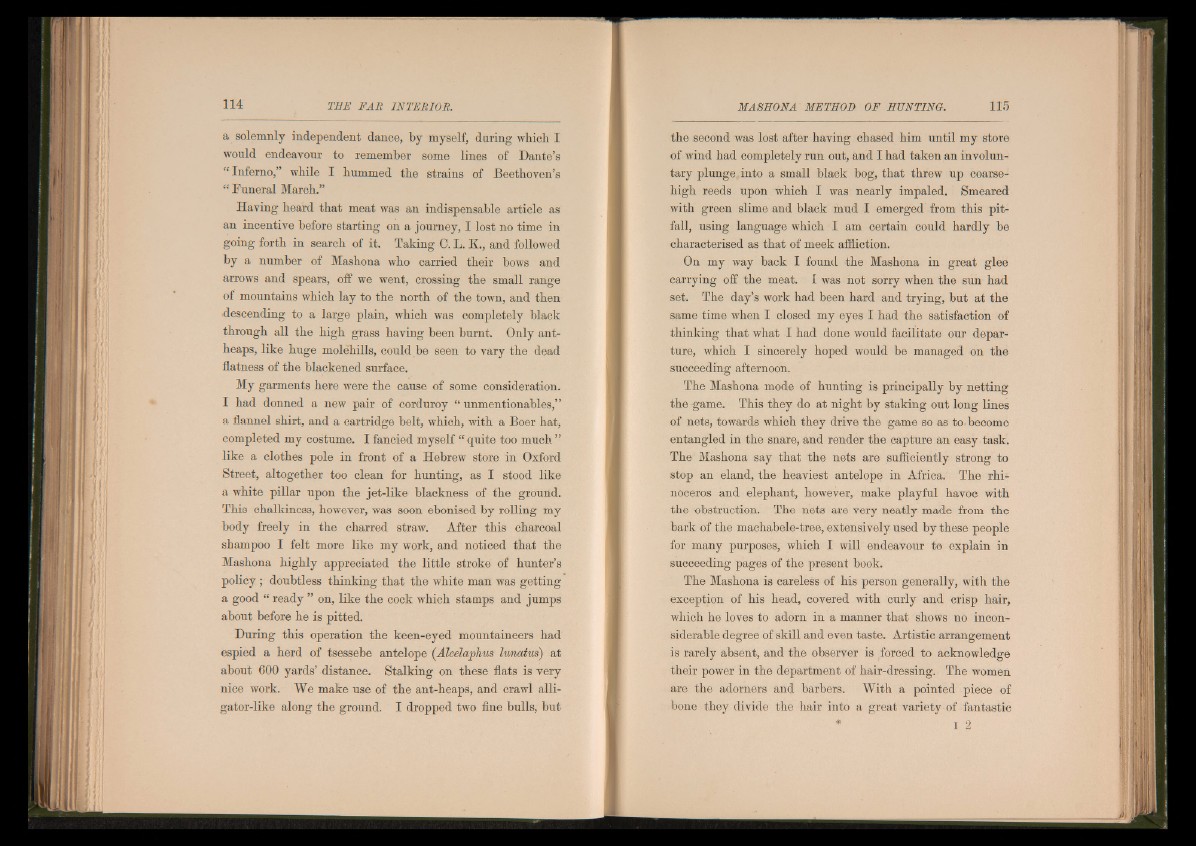
a solemnly independent dance, by myself, during which I
would endeavour to remember some lines of Dante’s
“ Inferno,” while I hummed the strains of Beethoven’s
“ Funeral March.”
Having heard that meat was an indispensable article as
an incentive before starting on a journey, I lost no time in
going forth in search of it. Taking C. L. K , and followed
by a number of Mashona who carried their bows and
arrows and spears, off we went, crossing the small range
of mountains which lay to the north of the town, and then
•descending to a large plain, which was completely black
through all the high grass having been burnt. Only ant-
heaps, like huge molehills, could be seen to vary the dead
flatness of the blackened surface.
My garments here were the cause of some consideration.
I had donned a new pair of corduroy " unmentionables,”
a flannel shirt, and a cartridge belt, which, with a Boer hat,
completed my costume. I fancied myself “ quite too much ”
like a clothes pole in front of a Hebrew store in Oxford
Street, altogether too clean for hunting, as I stood like
a white pillar upon the jet-like blackness of the ground.
This chalkiness, however, was soon ebonised by rolling my
body freely in the charred straw. After this charcoal
shampoo I felt more like my work, and noticed that the
Mashona highly appreciated the little stroke of hunter’s
policy ; doubtless thinking that the white man was getting
a good “ ready ” on, like the cock which stamps and jumps
about before he is pitted.
During this operation the keen-eyed mountaineers had
espied a herd of tsessebe antelope (Alcelaphus limcdus) at
about 600 yards’ distance. Stalking on these flats is very
nice work. We make use of the ant-heaps, and crawl alligator
like along the ground. I dropped two fine bulls, but
the second was lost after having chased him until my store
of wind had completely run out, and I had taken an involuntary
plunge, into a small black bog, that threw up coarse-
high reeds upon which I was nearly impaled. Smeared
with green slime and black mud I emerged from this pitfall,
using language which I am certain could hardly be
characterised as that of meek affliction.
On my way back I found the Mashona in great glee
carrying off the meat. I was not sorry when the sun had
set. The day’s work had been hard and trying, but at the
same time when I closed my eyes I had the satisfaction of
thinking that what I had done would facilitate our departure,
which I sincerely hoped would be managed on the
succeeding afternoon.
The Mashona mode of hunting is principally by netting
the game. This they do at night by staking out long lines
of nets, towards which they drive the game so as to become
entangled in the snare, and render the capture an easy task.
The Mashona say that the nets are sufficiently strong to
stop an eland, the heaviest antelope in Africa. The rhinoceros
and elephant, however, make playful havoc with
the obstruction. The nets are very neatly made from the
bark of the machabele-tree, extensively used by these people
for many purposes, which I will endeavour to explain in
succeeding pages of the present book.
The Mashona is careless of his person generally, with the
exception of his head, covered with curly and crisp hair,
which he loves to adorn in a manner that shows no inconsiderable
degree of skill and even taste. Artistic arrangement
is rarely absent, and the observer is forced to acknowledge
their power in the department of hair-dressing. The women
are the adorners and barbers. With a pointed piece of
bone they divide the hair into a great variety of fantastic